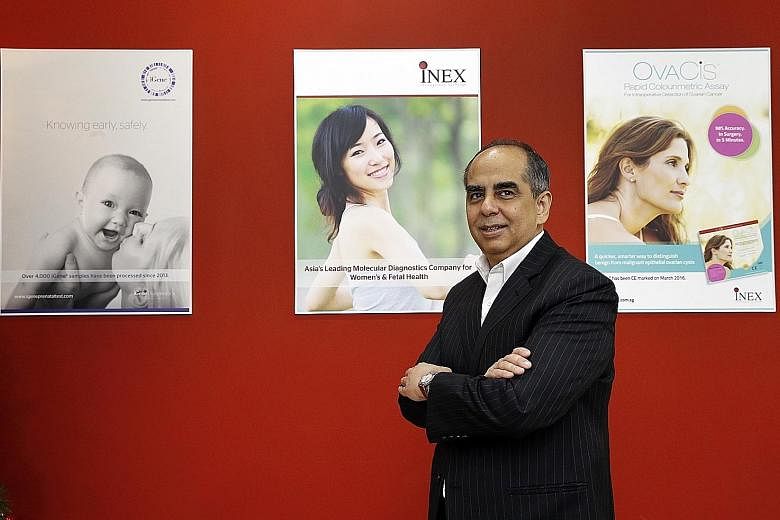Q How did INEX get started?
A We spun out from the National University of Singapore (NUS) in 2006 to commercialise the IP (intellectual property) we had developed.
We focus on diagnostics in women's healthcare and we're interested in two main areas - one is pregnancy and the foetus, the other is ovarian cancer.
In pregnancy and the foetus, we have a test that we sell in hospitals in Singapore and the region, known as iGene, which is a form of non-invasive prenatal testing for Down syndrome.
The second thing that we do is a technology that we have built locally and we have worldwide IP for it. It's for the detection of early ovarian cancer, and can be used before women undergo surgery for ovarian cysts.
Q How does iGene work?
A It screens for Down syndrome in the first trimester of pregnancy. We take a sample of blood from the mother's arm, so we avoid invasive testing like amniocenteses. Basically, the idea is to avoid invasive testing.
For now, we send the sample to Hong Kong for analysis. We do genome sequencing in Hong Kong, we get the assay result and we distribute the assay results to our colleagues and doctors in Singapore.
Right now, it's being done overseas because we're waiting for regulatory clearance for our lab in Singapore. The Singapore lab is already set up and ready to run. We submitted all the documentation to the ministry about six months ago.
Right now, there are several companies that sell the test in Singapore. We hope that when our lab is licensed or approved to run, we'll be the first in Singapore to deploy this test. That is our dream.
Q What makes iGene revolutionary?
A Prior to this, there were two ways of detecting Down syndrome. One was an invasive method known as amniocentesis - where you put a needle in the uterus, take out some amniotic fluid, and that carries the risk of miscarriage with it.
But before that, in about 2004 when I was at NUS, we launched a test which looked at the back of the baby's neck to calculate the risk of Down syndrome. But that test has a detection rate of about 84 per cent to 85 per cent.
The iGene test looks at the genetic material that leaves the placenta and goes into the baby's bloodstream, and we do the sequencing from there, and so this test is actually looking directly at the foetal genetic material. iGene has a 99 per cent detection rate.
Q Is it difficult to get clearance?
A It's a revolutionary test, it's a brand new test. So the ministry needs to do its due diligence, it has to speak to all the academic colleges to make sure that everyone is comfortable with deploying it in Singapore.
Q Where was the tech behind iGene developed?
A This particular technology was invented and produced in Hong Kong and the United States.
We are currently working with A*Star (the Agency for Science, Technology and Research), NUS and the National University Hospital to develop the next generation of iGene testing.
Q How would the next generation of iGene testing work?
A Instead of extracting the DNA, we will extract the cells from the maternal blood.
The beauty of extracting the cells is there's a nucleus sitting inside, and the nucleus actually carries the baby's full genetic complement.
With today's technology, we can actually sequence the whole genome and we can read all the genetic information of the foetus through those few cells. So we can test for 4,000 to 6,000 genetic conditions - that's the holy grail to us in obstetrics and gynaecology.
Q How close are you to your goal?
A We're in the research and development phase for the next generation of iGene testing.
To put it in a different way, I'm very confident that within the next five years, we will see this as a reality. We're that close to the end point. The world has been working on this for more than 30 years now.
Q It's like a race then?
A It is a race, and there are a few groups in this race, and hopefully it doesn't have to be only one winner.
There will be hopefully at least two or three parties that can make this happen.
In science, it's important that for things to really be robust and believable, more than one person should be able to do it. So if a few of us can get to the end point, then we'll know that this technology is robust and we'll be able to help unborn foetuses and mums.
Some of our potential competitors are actually potentially our collaborators. They actually want to work with us because we have got tremendous advantage in place for downstream processing of this technology.
Q What IP do you have?
A We are working with one of the A*Star institutes, the Institute of Microelectronics, which has a special filter they are using to help us to find the foetal cells from maternal blood.
They are very rare, but we've got the know-how to harvest these cells and the IP rights on the technique.


